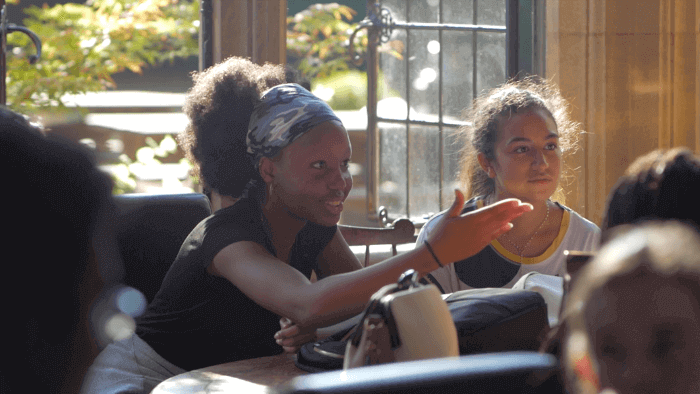Three Things I Learned in the Scholastica Discussion Group

I was really lucky to attend the Oxford Scholastica Academy back in 2017 as part of the Creative Writing Summer School. In one of our classes, our teacher introduced us to an article by William Deresiewiez, discussing the disadvantages students face at an ‘elite’ school. At the time, I wasn’t able to relate to it much, because I had not yet experienced studying at university. However, I now realize how well it resonates with my new reality.
The disadvantages Deresiewiez is referring to are that the best universities around the world are providing an education that focuses solely on getting students onto a career path, instead of one that expands their minds. Most students around me, including myself, picked their majors based on what they thought would land them a better job. In classrooms, I often hear sentences like “How useless is this class?”, “Where do we see this in real life?”, “Why do we as [input major name] have to study this again?” All of this frustration left me wondering whether learning is bound to be such a boring, limited process. Here’s when Oxford Scholastica comes into the picture again.
Recently, Oxford Scholastica gave us (alumni, future students and anyone of our friends, pets or family members) the chance to participate in an online discussion group. The main topic of our discussion was narrative and how we encounter it everywhere. Over seven sessions, we investigated many forms of narrative ranging from micro-fiction, to comedy, paintings and more! With this discussion group, I found learning to be a fun, ever-expanding process. Here are some of the things I learned, along with examples of how I encountered them again in my day-to-day life.
Biases
In another session, we discussed heuristics and biases. These are usually subconscious thoughts that our minds use to simplify a decision-making process. In simple terms, biases are like shortcuts that our minds take to lead us towards a certain choice, which is not necessarily the “correct” one. There is an interesting (and much more technical) book by Daniel Kahneman on this topic, called “Thinking, Fast and Slow.”
Biases crop up all around us. For example, my cousin and I were scrolling through our phones, and he suddenly asked me: “What is a Channing Tatum?” My brain is filled with random pop culture references, so I knew immediately that he had structured his question incorrectly. But when I tried enlightening him with the truth, my cousin did not buy it. He said he thinks it’s more likely that Channing Tatum is a chemical element and he provided me with the following pieces of evidence: there was a picture of a rock on the website he was checking, and the name was too weird for a person. Knowing my cousin is a fan of chemistry, it became clear that he had fallen to his own confirmation bias. He was using any type of evidence he could find that would support his beliefs. Such biases happen all the time, but one way to avoid them is to always seek or think of counter examples (alternative narratives). Had my cousin thought of the possibility of Channing being an actor, he would have found a stronger set of evidence to confirm that reality.
The power of Micro-fiction
In our first session, we were introduced to micro-fiction, which is, as the name suggests, a tiny story. We looked at stories told in only six words. I found this to be an interesting twist on the way we imagine stories. Six words is usually (or sometimes less than) enough to form a single opening or ending sentence, so it’s fascinating to use them to tell a story in its entirety.
A famous example of micro-fiction we discussed was Earnest Hemingway’s: “For sale: baby shoes, never worn.” When I showed this to my friend, she read it twice. She expressed visible shock the first time, and she teared up the second time. When you look at such a short sentence, you don’t expect it to be that powerful, hence the initial shock. But once you allow space for your mind to imagine the narrative gluing these words together, there’s room for greater impact in the reader’s reaction.
We were also asked to write our own micro-fiction. As a student, I’m constantly asked to write essays consisting of at least a thousand words, and that’s no big deal. However, writing six words is a different kind of task altogether. There’s so much weight assigned to each word you choose to put in, so you have to be extremely careful. It was really fun seeing what everyone came up with, and I now enjoy looking for micro-fictions around me. Here’s a chilling one I found reading David Sheff’s book: “I woke up with a corpse”.
Conclusion
Finally, in one of the discussion group sessions, someone mentioned that in every narrative, the writer must make a choice on what to include and what to leave out. This is really what distinguishes a great writer from an average one. Since I can’t include everything that we talked about, this shall be the end of my narrative on the impact of the discussion group.
Every narrative proposes or allows us to search for a meaning. The narrative I have traced through my discussion group with Oxford Scholastica’s Summer School helped me to understand this learning experience better. I have realized that learning can happen anywhere, be it in a classroom or from the comfort of your own home. I know that even those “useless” classes I mentioned at the beginning have the potential to form at least one narrative!
Recommended articles
Best Universities to Study Medicine in the World
A degree in Medicine spans many years, so it’s important to make a good choice when committing yourself to your studies. This guide is designed to help you figure out where you'd like to study and practise medicine. For those interested in getting a head start, the...
What Is A Year Abroad?
One of the great opportunities offered to UK university students is taking a year abroad. But what does this involve? Who can do it? What are some of the pros and cons? In our year abroad guide, we’ll explain some of the things to bear in mind when considering this...
The Ultimate Guide To Summer Internships
Are you eager to make the most of your summer break and jumpstart your career? There are so many productive things students can do in the summer or with their school holidays, and an internship is one of the most valuable! A summer internship could be the perfect...
Looking to take part in an Oxford summer course?


